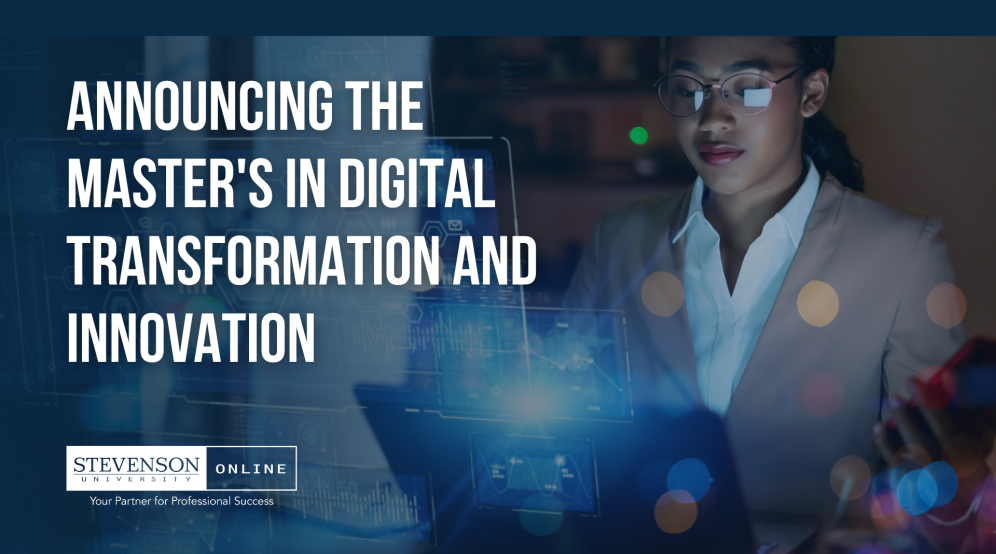Stevenson University Online’s M.S. in Digital Transformation and Innovation has replaced the M.S. in Business and Technology Management program, with a renewed focus on the skills needed by today’s professionals responsible for optimizing business and organizational processes and systems through technology.
Digital transformation is a widely acknowledged business practice that focuses on the effective management of technology, data, processes, and organizational change to move companies forward. The online Master’s in Digital Transformation and Innovation provides the leading-edge qualifications for professionals seeking career opportunities at the intersection of technology and business.
We spoke with P.B. Garrett, former SU Chief Information Officer, about Digital Transformation and Innovation and its importance in businesses today. With more than 25 years of leadership experience, P.B. has garnered an impressive technical record of accomplishment as a leader in various facets of digital innovation, including enterprise applications, asset management, business process improvement, contract and vendor management, cloud strategies, educational research and technology, and pedagogical design and development. Here’s what she has to say about the online Digital Transformation and Innovation master’s program:
What role does Digital Transformation and Innovation (DTI) play in most businesses today?
Digital Transformation and Innovation plays a paramount role in all businesses today whether it is known and acknowledged, or not. The technology shifts that occur spawn new operating models that transform the operations, value proposition, revenue streams, and strategic direction of the business. DTI enables new approaches to how business leaders interact within their organization and outside of their organization, and it requires flexible leaders that are willing to try new innovative methods to successfully achieve their strategic mission and goals. The only thing constant in the business world today is change, and technology is evolving at an astonishing speed therefore businesses that adapt and aspire to meet that change will not only survive but they will thrive.
How does DTI guide decision-making by corporate and business leadership?
Business models will mature to reflect a data-informed and continuous improvement approach to decision making and management with a reliance on rich data and analytics with robust Artificial Intelligence elements.
Why pursue a Master’s degree in DTI?
Many of the technology shifts in DTI such as Artificial Intelligence, public and private clouds, data analytics, mobile technologies, intricate digital architectures, computational and visualization analysis, social networks, and storage capabilities are creating the need for new skills and competencies. Organizations are reliant on these data-related competencies as well as service management, change management, customer experience, and process management – thus today’s workforce will need to have these technology and data skills to fully understand business unit functions and goals. Obtaining a master’s degree in DTI will provide the knowledge and skill sets required to be competitive and successful in today’s job market.
What types of jobs can one get with a Master’s in DTI?
There are a plethora of IT jobs that this degree would be beneficial in such as high-level and mid-level tech positions (some may require additional certifications); however, there are jobs that this degree would also be beneficial in that are not in the IT sector.
Below are just a few examples:
- Chief Information Officer
- Chief Technology Officer
- Chief Data Architect
- Chief Information Security Officer
- Management roles in Business Development, Enterprise Application Development, Data Management, Systems Architecture and Administration, Identity Access, Project Management, Security, Client Services, Service Management, Vendor Management, Business Relationship Management, etc.
- Data Analyst
- Data Engineer
- Database Specialist
- Systems Engineer
- Systems Analyst
- Security Analyst
- Help Desk Analyst
- Desktop Support
- Communications
What are emerging trends in DTI?
Virtual Reality (VR), Extended reality (XR), Robotics, Blockchain, Data Visualization, and Internet of Things (IoT) to name a few.






